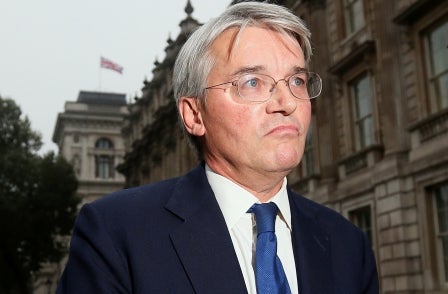
The "Plebgate" row was "just a quirky incident with a gentleman on a bicycle who had the hump", the High Court has heard.
Ian Richardson, who was the senior police constable in Downing Street that night in September 2012 rebuffed a claim by James Price QC, counsel for former Government chief whip Andrew Mitchell (pictured: Reuters) that it was a "serious incident".
Richardson, who has recently retired after 30 years with the Met, told Mr Justice Mitting that Mitchell was annoyed when he was directed to the pedestrian gate and seemed "extremely irritated" as he dismounted.
"There was a short period, which I would describe as a Mexican stand-off when we didn't say anything and he didn't say anything and I just wondered what he was going to do."
After a few seconds, he heard Pc Toby Rowland, whose account of the altercation was the basis of the allegedly libellous story in The Sun, ask the MP not to swear at him, so he moved over to listen, after telling his colleagues "Hello, I think it's going off over there".
Pc Rowland told him what had happened, how he had threatened to arrest the MP and that Mitchell had told him he had not heard the last of it.
Mitchell claims that the report, which News Group Newspapers (NGN) said was substantially true, meant he was guilty of launching a grossly offensive and arrogant attack at Downing Street police officers, branding them "fucking plebs".
Pc Rowland, who is in turn suing Mitchell over statements he made from December 2012 which he said accused him of fabricating his allegations, has said he gave Mr Mitchell a warning because members of the public were visibly shocked by the MP swearing at him.
Richardson told Price that he made a few notes from memory at the time because of what Pc Rowland had said about Mitchell's parting words, although he did not regard it as a significant incident.
"It was a trivial nonsense incident," he said.
"It wasn't a murder scene.
"It wasn't putting tape up.
"You must appreciate that at the time it was just a quirky incident with a gentleman on a bicycle who had the hump, and then he had gone.
"It wasn't a crime scene sir, it wasn't a crime scene.
"Well, it is now but it wasn't then."
Price said: "It was a serious incident."
Richardson said: "It wasn't a serious incident, sir."
Price continued: "If an officer has given a Public Order Act warning to a cabinet minister in Downing Street, it might not be a murder scene or a serious crime scene, but it's a pretty significant matter."
Richardson responded: "I knew my superior had to be informed.
"I was the senior constable there so I made a tiny effort to get the ball rolling a bit, principally because of what Mr Mitchell had said in parting to Mr Rowland because I know how these things have a habit of snowballing."
He denied Price's suggestion that he discussed with Pc Rowland how he was going to justify giving the warning.
"As a policeman who had served 30 years, it was for Toby to justify what he decided to do," he said
"It's not for me to justify what he decided to do.
"It's his case.
"That's policing, I'm afraid.
"You put up and shut up."
Price said: "The reason you didn't record the most important fact is because it didn't happen – `fucking plebs'."
Richardson responded: "The reason I didn't record those words were because: A; I thought it was a minor incident, B; I knew Toby was going to do a report for the governor, C; I was eating my sandwiches and couldn't be arsed to write too much more frankly – laziness – sorry about the language."
Mr Justice Mitting: "Don't worry about it at all."
Richardson said that he asked Pc Rowland if there was anyone nearby who could help with evidence as to what had happened – not to justify the warning but because of what Mitchell had said about the officers not having heard the last of it.
"I was anxious we were in a position, if need be, to defend ourselves, how we behaved that night," he continued.
"If we could have found a member of the public who backed up what Toby said, what Mr Mitchell was like when he was on his bike, it would be power to our elbow because I suspected that Mr Mitchell would come in the next morning, speak to the Prime Minister and say officers had been rude to him.
"The Prime Minister would probably ring the Home Secretary who would ring the Commissioner.
"The Commissioner would ring Mr (Chief Superintendent) Tarrant and guess who would have been in the fire?
"Us, sir.
"So I was anxious, as senior constable there, to circle our wagons and try and establish if we could find an independent witness.
"I felt that if Mr Mitchell complained about us, which seemed likely from what he apparently said when he left, I felt we needed to be bomb-proof.
"I wanted to establish the truth and support Toby because I believed Toby, so of course I was interested in getting evidence to help support his version of what happened behind the (police control) box out of my earshot.
"If it had been a murder scene, we would have had both ends of the road sealed off and taken people's names and addresses, but after we'd had a little conflab it was too late."
Email pged@pressgazette.co.uk to point out mistakes, provide story tips or send in a letter for publication on our "Letters Page" blog
